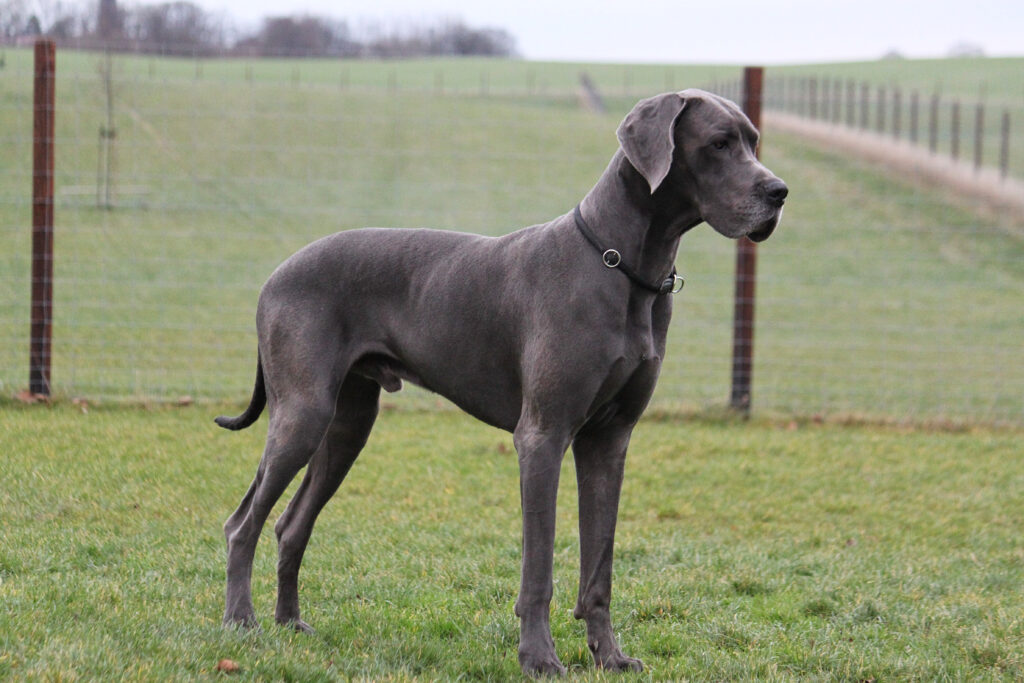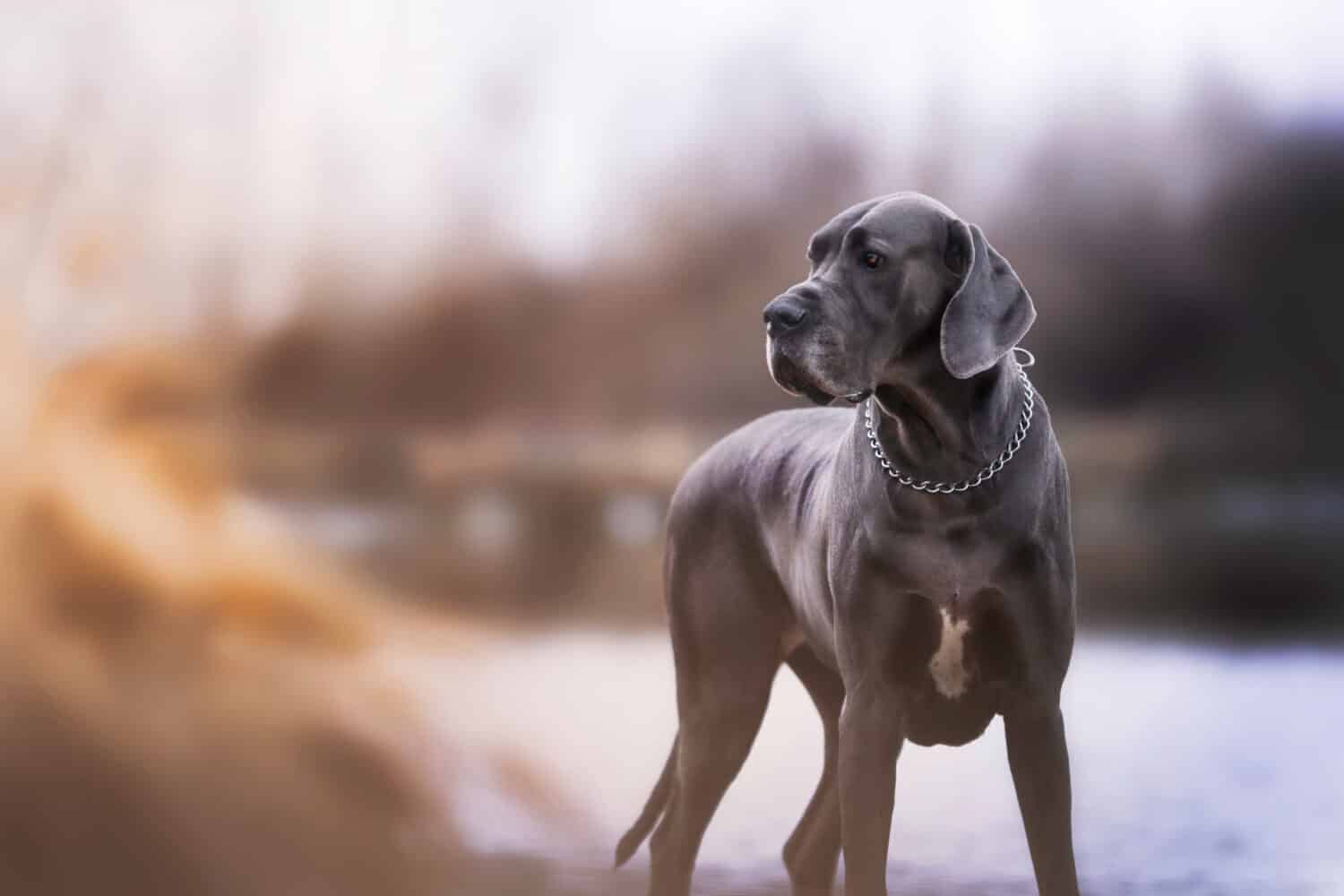Great Danes are often considered decently intelligent dogs. They aren’t the most intelligent but aren’t at the bottom of the pack, either. But, “How smart are Great Danes” can be a bit complicated to answer.
Exactly what determines a dog’s intelligence varies. Some breeds excel in problem-solving, while others have a strong ability to understand and follow commands. Dog breeds have different histories that determine what exactly they’re best at.
Great Danes, being a large and gentle breed, might not necessarily excel in tasks that require high levels of agility or quick decision-making, but they can still be trained to be well-mannered and obedient companions.
They can learn commands relatively quickly and often want to please their owners. However, they are very large and laid-back, which can lead to some challenges in training. While they might pick up on commands, they might not always be as eager to obey them, especially if they’re not properly motivated or engaged.
Exploring the Intelligence of Great Danes
There are many aspects of canine intelligence that we can look at. While ease of training is often considered a hallmark of intelligence, it isn’t the only marker.
Trainability
Perhaps the most obvious indication of intelligence is trainability. Great Danes can be trained relatively easily, at least in basic commands. However, they may not always be eager to comply with commands, as they tend to be somewhat independent.
Adaptability
Intelligence in dogs often involves adaptability to different situations. Great Danes are known for their gentle and calm demeanor, which can sometimes be mistaken for lower intelligence. However, their ability to remain composed and well-behaved in various environments can actually be a sign of their intelligence.
Social Skills
Great Danes are very good with people and other animals. They have pretty good social skills, which also require some intelligence. They’re friendly and approachable.
Problem Solving
Great Danes aren’t known for being able to complete advanced problem-solving tasks. However, they do possess a certain degree of problem-solving. They tend to be less motivated than other breeds, though. They may just not want to try very hard.
Alertness
While not your average guard dog, Great Danes are pretty alert and aware of their surroundings. They might not display the same level of vigilance as some other breeds, but their ability to sense changes in their environment shows a level of intelligence.
The Cognitive Capabilities of Great Danes: Understanding Their Problem-Solving Skills and Brain Size

Great Danes are huge dogs. In fact, they’re one of the biggest dogs in the world.
©iStock.com/GlobalP
Brain size isn’t necessarily a good indicator of a dog’s intelligence. Humans are easily considered one of the smartest animals on the planet, but many species have larger brains than us.
Great Danes are large dogs and, therefore, have large brains. However, that doesn’t mean they are the smartest breed out there.
These dogs do have a decent amount of problem-solving abilities, which are influenced by their intelligence. They can navigate different challenges and find solutions to problems. However, they don’t excel at problem-solving tasks compared to some other breeds.
Great Danes have a decent learning capacity, contributing to their problem-solving skills. They can learn routines, commands, and behaviors through consistent training. Their ability to retain and apply information to different situations reflects their cognitive capabilities.
However, they don’t have the best memory or recall. They may forget commands if they aren’t used very often, so it’s important to add their commands to your everyday life.
Great Dane’s Learning Aptitude: How Quick and Adaptive Are They?
Great Danes are not known for being the fastest learners among dog breeds, but they can learn commands and behaviors. They require around 40 repetitions before they learn a command, which will take several training sessions.
Of course, how you are training them also matters. Motivating them properly with treats and being as clear as possible is important. More complicated cues will take longer than shorter ones.
These dogs need repetition and positive reinforcement. If you get them excited about learning, it is much easier to teach them.
That said, these dogs are very adaptable. They can live in various homes and do well in different situations, especially when well-socialized. They adapt very well. This trait should be considered a boon, as it makes them much easier to control in new, exciting situations.
Great Danes have a laid-back temperament, which can influence their learning aptitude. They might not always be as driven or eager to learn as some more high-energy breeds. Finding what motivates your individual Great Dane and using that as a reward during training can enhance their learning experience.
Often, motivating these dogs is a key part of their training.
Intelligence Ranking: Where Does the Great Dane Stand Among Other Breeds?
Ranking canine intelligence is challenging. There are so many different ways dogs can be intelligent, after all. However, most people use training ability to determine a dog’s intelligence, largely because it is one of the easier options to study.
Dr. Stanley Coren’s book “The Intelligence of Dogs” is a well-known reference that categorizes dog breeds into different levels of intelligence based on working and obedience intelligence. According to Coren’s criteria, Great Danes are placed in the “Average” category for working and obedience intelligence.
However, it is important to note that he primarily used how long it took a dog to learn a task as the basis for intelligence. Dogs who learned faster were rated higher. We know that this isn’t the only type of intelligence, though.
Being in the “Average” category, Great Danes might take a bit more time to learn new commands and might not have the same instinctual drive to work closely with humans as some other breeds. However, this doesn’t mean they are not intelligent dogs.
Unlocking Great Dane’s Intelligence Potential: Training Techniques and Mental Stimulation

Great Danes are often considered to be gentle giants. Though big, these dogs are playful and loyal.
©iStock.com/Credit:BiancaGrueneberg
To make the most of a Great Dane’s intelligence, you must use effective training techniques and provide them with mental stimulation. Great Danes respond well to positive reinforcement techniques. Use treats, praise, and affection as rewards for desired behaviors.
This creates a positive association with learning and encourages them to repeat the behavior.
Consistency is key in training. You need to use the same commands every time and use cues that won’t cause confusion. Everyone in the household should use the same commands to ensure that dogs understand what is going on.
Keep the training sessions short to maintain a dog’s attention and prevent frustration. Aim to do several short sessions throughout the day instead of one longer session.
Always use basic commands like “sit” and “come.” Then, you can work up to more complex commands.
Great Danes benefit from mental stimulation, as well. You must ensure they’re continually using their mind and have plenty of mental games to play. You can try interactive toys, puzzle feeders, and games to encourage their problem-solving skills.
Ready to discover the top 10 cutest dog breeds in the entire world?
How about the fastest dogs, the largest dogs and those that are -- quite frankly -- just the kindest dogs on the planet? Each day, AZ Animals sends out lists just like this to our thousands of email subscribers. And the best part? It's FREE. Join today by entering your email below.
Thank you for reading! Have some feedback for us? Contact the AZ Animals editorial team.








